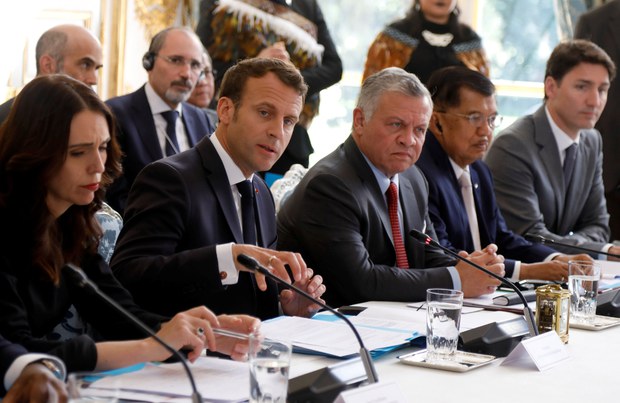Indonesian VP Calls on Tech Industry to Join Drive for Safer Internet
2019.05.16
Jakarta
 Indonesian Vice President Jusuf Kalla (second from right), joins (from left) New Zealand Prime Minister Jacinda Ardern, French President Emmanuel Macron, King Abdullah II of Jordan and Canadian Prime Minister Justin Trudeau at the Christchurch Call to Action in Paris, May 15, 2019.
Indonesian Vice President Jusuf Kalla (second from right), joins (from left) New Zealand Prime Minister Jacinda Ardern, French President Emmanuel Macron, King Abdullah II of Jordan and Canadian Prime Minister Justin Trudeau at the Christchurch Call to Action in Paris, May 15, 2019.
The information technology industry must share responsibility for safeguarding the internet from militancy and radicalism, Indonesia’s outgoing vice president told world leaders at a Paris summit focusing on eliminating violent extremism online.
Jusuf Kalla said governments should work with technology companies to implement a code of conduct and improve internet governance in a collective effort to counter the extremist threat in the digital sphere.
“The entire information technology industry bears shared responsibility in making the internet safer and healthier for all,” he told the Christchurch Call to Action meeting, co-hosted by French President Emmanuel Macron and New Zealand Prime Minister Jacinda Ardern at the Elysée Palace in Paris on Wednesday.
The vice president was representing the world’s most populous Muslim-majority nation and the largest nation in Southeast Asia – where governments have been grappling with Muslim extremism and the threat of online recruitment of young people by Islamic State (IS) and other militant groups.
Indonesia was among nine countries and a host of big tech companies – including Amazon, Facebook, Google and Twitter – that adopted the non-binding Christchurch Call at the end of Wednesday’s meeting. Kalla was the only senior Southeast Asian leader at the meeting in the French capital.
The United States did not join the Christchurch Call to Action, citing concerns that the pact could violate free speech protections in the First Amendment, according to media reports.
The summit was named after New Zealand’s second largest city, where an Australian-born man suspected to be a white supremacist went on a shooting rampage at two mosques on March 15, killing 51 people, including five Bangladeshis, an Indonesian and a Malaysian.
The suspect, Brenton Tarrant, 28, allegedly live-streamed the shootings on social media. Australian media reported that Tarrant was addicted to violent video games.
“Never have so many countries and tech companies come together in reaction to such an attack to work together to use new technology and develop new technology so our communities are safer,” Jacinda Ardern, New Zealand’s prime minister, told a post-meeting news conference in Paris, according to The Guardian.
The March 15 attack in her country prompted calls for curbs on violent video games, with Indonesian officials and Muslim leaders considering banning games such as PUBG (PlayerUnknown’s Battlegrounds).
Indonesia’s large youth population
Indonesia, a nation of 260 million people, is a prolific user of social media. Government officials in recent years have warned that terrorist organizations including IS were using such online platforms to spread propaganda and recruit young Indonesians.
In 2017, the Indonesian government agreed with YouTube and Twitter to tighten monitoring by allowing selected users to flag material deemed as being linked to terrorism.
In Paris, Kalla said that more than one third of 150 million internet users in Indonesia were young people vulnerable to exposure to radicalism and violent extremism. Indonesia had a program to engage the help of youths in improving content on the internet.
Since 2015, Indonesia has organized a Youth Ambassadors for Peace program to involve young people in spreading peaceful messages online in the fight to counter extremist and hateful ideas on the internet. The nation has appointed 780 youth ambassadors and this year the program expanded by bringing more than 100 young people from other Southeast Asian countries.
“This approach shows that the internet has become the latest battleground, both in conducting and fighting terrorism,” he said. “We must empower our young people.”
Kalla, who did not join President Joko “Jokowi” Widodo’s re-election campaign, will leave office after official election results are announced on May 22. Quick counts following the vote last month showed Jokowi with a sizeable lead over challenger Prabowo Subianto.
On Thursday, Foreign Ministry spokesman Arrmanatha Nasir said the Paris meeting showed that international cooperation was needed to fight terrorism.
“It takes a joint effort to prevent extremism and radicalism. One of the messages conveyed at the meeting is that no country that is immune from radicalism,” he said.
Meanwhile, a researcher on Islamic radicalism claimed that online recruitment had yet to take off in Indonesia, adding that face-to-face recruitment was relatively unimpeded.
“One of the reasons is that terrorists don’t entirely trust online recruitment. This is because it is so easy to falsify one’s identity online – men can pretend to be women, or vice versa, and fraudsters and intelligence agents can easily pretend to be fellow jihadists,” said Solahudin, a researcher on Islamic radicalism who published a study on the topic on the University of Melbourne’s website.
“Law enforcement officials have no legal instruments to act against extremists who hold prayer study groups, even in public,” he said. “[Islamic State] supporters still freely hold religious study groups in mosques across the country with little concern about being arrested by authorities.”







